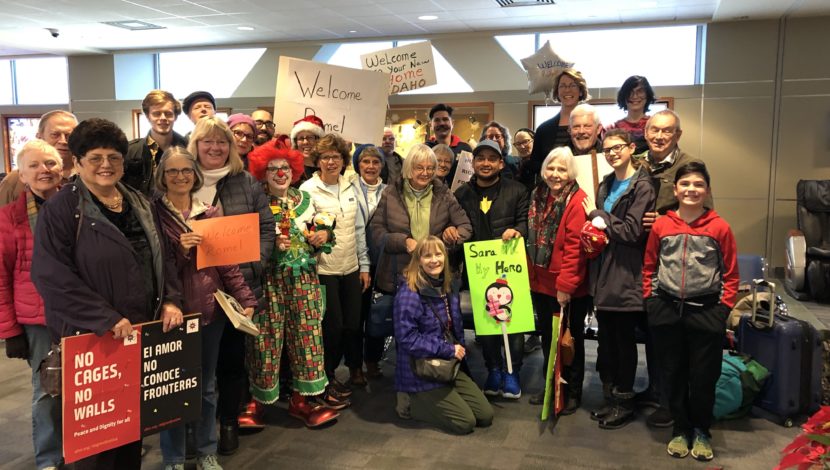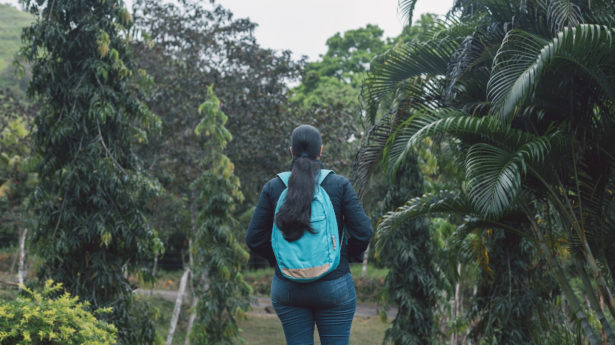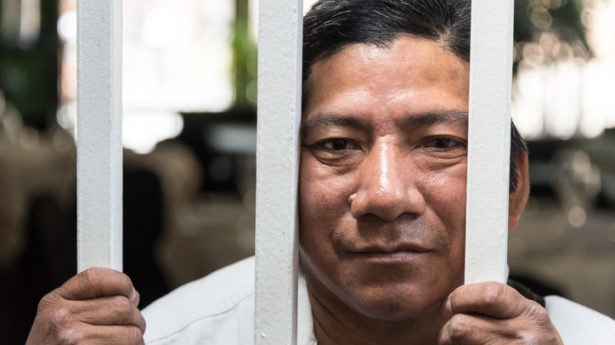The Unitarian Universalist Service Committee advances human rights through grassroots collaborations.
A Safe Path to Asylum: Accompaniment as an Act of Love

By Heather Vickery on June 30, 2022
Recent events have highlighted the plight of people fleeing war, economic hardship, and other threats. Eleven years after the start of the Syrian civil war, there are nearly 7 million Syrian refugees and asylum-seekers worldwide. Since the U.S. withdrawal from Afghanistan in August 2021, more than 76,000 Afghan refugees have arrived in the United States. Most recently, the world has turned its attention to the brutal war in Ukraine, which has forced more than 6 million Ukrainians to flee their home country. More than 90% of these Ukrainian refugees are women and children.
World Refugee Day on June 20 reminds us that seeking safety from persecution, conflict, and abuse is recognized as a universal human right. In support of this human right, UUSC and congregations around the country are supporting asylum seekers at our borders through our Congregational Accompaniment Project for Asylum Seekers (CAPAS). Given the enormity of the refugee crisis, why are we running a program that supports asylum-seekers? Why asylum-seekers and not refugees? Indeed, what is the difference between the two?
According to the U.S. government, refugees are people who are outside the United States and have been approved to enter the nation because of persecution that they face, whereas asylum-seekers arrive at the United States border with the hope of being protected from additional harm. Asylum-seekers generally do not have the support that people with refugee status receive. For example, a new program, Uniting for Ukraine, streamlines the process for Ukrainian refugees to enter the United States, and there is general public support for this effort.
Similarly, many Afghan refugees are receiving assistance from the State Department and other government entities. Refugees receive resettlement benefits, such as a small cash stipend, a few months of housing, expedited work permits, health care, and more. Though these aren’t long-lasting or substantial benefits by any means, they do give refugees an important foundation for starting their lives over in the United States.
By contrast, most asylum-seekers make their own way to the United States. Traveling from an area stricken by gang violence, poverty, and corruption to the U.S. border is rarely, if ever, uncomplicated. Asylum-seekers persevere through their arduous and often dangerous journeys, only to arrive in the United States and face a cold, uncaring system as they attempt to apply for asylum. This process is a deliberately difficult one designed to discourage applicants.
Families are often separated; single individuals are detained for days, weeks, or months at a time; many are sent back to Mexico to await their asylum hearings in border camps full of unsanitary conditions. If they are admitted into the United States and released from detention, they may be shackled with painful ankle bracelets and sent to overcrowded shelters. If they are so lucky as to make it this far, then they face a court system that is highly stacked against them, must find work without a work permit, and find housing with little documentation or savings. Can you imagine coming so far to seek safety without assistance in providing for your basic needs or help navigating the asylum process?
CAPAS congregations provide critical solidarity by welcoming asylum seekers and providing the essential resources they need to thrive, not just survive. This includes housing, food, legal and medical assistance, transportation, English language instruction, and driver’s license and employment training. They provide families who are seeking asylum a better chance of achieving asylum by helping them understand the process and challenge the many barriers put in their way. Given the trauma that so many asylum-seekers have faced in their home countries, these families need a safe space to heal.
Congregations work with local community organizations to help families find a safe path to the asylum they deserve—the asylum that we, as UUs, believe is a human right. Our volunteers walk with our guests and offer compassion, support, and solidarity on each step of their journey to asylum. CAPAS congregations provide life-changing support in an otherwise broken system. Our asylum-seeking guests know they have people on and at their side.
In short, to answer the question above, the difference between asylum-seekers and refugees is not a difference in needed safety, but a difference in how our country categorizes and values them. By becoming a CAPAS congregation, you are making clear that all are welcome and all are loved.
Learn more about how you can support these efforts and start your congregation on the path to becoming a CAPAS congregation at www.uusc.org/CAPAS.

